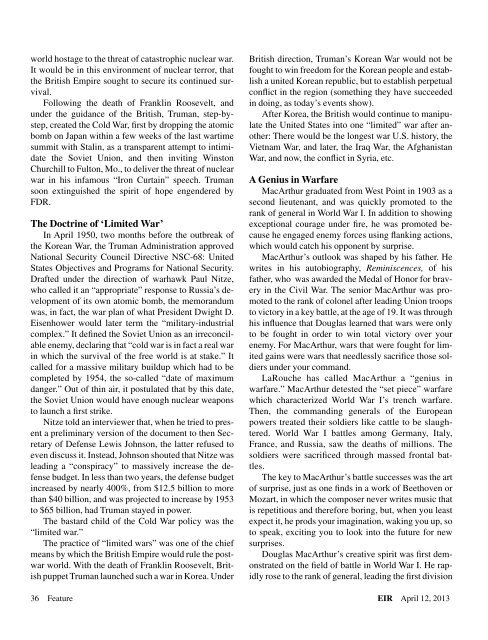MacArthur's Victory at Inchon: Defeating the British Empire by Don ...
MacArthur's Victory at Inchon: Defeating the British Empire by Don ...
MacArthur's Victory at Inchon: Defeating the British Empire by Don ...
You also want an ePaper? Increase the reach of your titles
YUMPU automatically turns print PDFs into web optimized ePapers that Google loves.
world hostage to <strong>the</strong> thre<strong>at</strong> of c<strong>at</strong>astrophic nuclear war.<br />
It would be in this environment of nuclear terror, th<strong>at</strong><br />
<strong>the</strong> <strong>British</strong> <strong>Empire</strong> sought to secure its continued survival.<br />
Following <strong>the</strong> de<strong>at</strong>h of Franklin Roosevelt, and<br />
under <strong>the</strong> guidance of <strong>the</strong> <strong>British</strong>, Truman, step-<strong>by</strong>step,<br />
cre<strong>at</strong>ed <strong>the</strong> Cold War, first <strong>by</strong> dropping <strong>the</strong> <strong>at</strong>omic<br />
bomb on Japan within a few weeks of <strong>the</strong> last wartime<br />
summit with Stalin, as a transparent <strong>at</strong>tempt to intimid<strong>at</strong>e<br />
<strong>the</strong> Soviet Union, and <strong>the</strong>n inviting Winston<br />
Churchill to Fulton, Mo., to deliver <strong>the</strong> thre<strong>at</strong> of nuclear<br />
war in his infamous “Iron Curtain” speech. Truman<br />
soon extinguished <strong>the</strong> spirit of hope engendered <strong>by</strong><br />
FDR.<br />
The Doctrine of ‘Limited War’<br />
In April 1950, two months before <strong>the</strong> outbreak of<br />
<strong>the</strong> Korean War, <strong>the</strong> Truman Administr<strong>at</strong>ion approved<br />
N<strong>at</strong>ional Security Council Directive NSC-68: United<br />
St<strong>at</strong>es Objectives and Programs for N<strong>at</strong>ional Security.<br />
Drafted under <strong>the</strong> direction of warhawk Paul Nitze,<br />
who called it an “appropri<strong>at</strong>e” response to Russia’s development<br />
of its own <strong>at</strong>omic bomb, <strong>the</strong> memorandum<br />
was, in fact, <strong>the</strong> war plan of wh<strong>at</strong> President Dwight D.<br />
Eisenhower would l<strong>at</strong>er term <strong>the</strong> “military-industrial<br />
complex.” It defined <strong>the</strong> Soviet Union as an irreconcilable<br />
enemy, declaring th<strong>at</strong> “cold war is in fact a real war<br />
in which <strong>the</strong> survival of <strong>the</strong> free world is <strong>at</strong> stake.” It<br />
called for a massive military buildup which had to be<br />
completed <strong>by</strong> 1954, <strong>the</strong> so-called “d<strong>at</strong>e of maximum<br />
danger.” Out of thin air, it postul<strong>at</strong>ed th<strong>at</strong> <strong>by</strong> this d<strong>at</strong>e,<br />
<strong>the</strong> Soviet Union would have enough nuclear weapons<br />
to launch a first strike.<br />
Nitze told an interviewer th<strong>at</strong>, when he tried to present<br />
a preliminary version of <strong>the</strong> document to <strong>the</strong>n Secretary<br />
of Defense Lewis Johnson, <strong>the</strong> l<strong>at</strong>ter refused to<br />
even discuss it. Instead, Johnson shouted th<strong>at</strong> Nitze was<br />
leading a “conspiracy” to massively increase <strong>the</strong> defense<br />
budget. In less than two years, <strong>the</strong> defense budget<br />
increased <strong>by</strong> nearly 400%, from $12.5 billion to more<br />
than $40 billion, and was projected to increase <strong>by</strong> 1953<br />
to $65 billion, had Truman stayed in power.<br />
The bastard child of <strong>the</strong> Cold War policy was <strong>the</strong><br />
“limited war.”<br />
The practice of “limited wars” was one of <strong>the</strong> chief<br />
means <strong>by</strong> which <strong>the</strong> <strong>British</strong> <strong>Empire</strong> would rule <strong>the</strong> postwar<br />
world. With <strong>the</strong> de<strong>at</strong>h of Franklin Roosevelt, <strong>British</strong><br />
puppet Truman launched such a war in Korea. Under<br />
<strong>British</strong> direction, Truman’s Korean War would not be<br />
fought to win freedom for <strong>the</strong> Korean people and establish<br />
a united Korean republic, but to establish perpetual<br />
conflict in <strong>the</strong> region (something <strong>the</strong>y have succeeded<br />
in doing, as today’s events show).<br />
After Korea, <strong>the</strong> <strong>British</strong> would continue to manipul<strong>at</strong>e<br />
<strong>the</strong> United St<strong>at</strong>es into one “limited” war after ano<strong>the</strong>r:<br />
There would be <strong>the</strong> longest war U.S. history, <strong>the</strong><br />
Vietnam War, and l<strong>at</strong>er, <strong>the</strong> Iraq War, <strong>the</strong> Afghanistan<br />
War, and now, <strong>the</strong> conflict in Syria, etc.<br />
A Genius in Warfare<br />
MacArthur gradu<strong>at</strong>ed from West Point in 1903 as a<br />
second lieutenant, and was quickly promoted to <strong>the</strong><br />
rank of general in World War I. In addition to showing<br />
exceptional courage under fire, he was promoted because<br />
he engaged enemy forces using flanking actions,<br />
which would c<strong>at</strong>ch his opponent <strong>by</strong> surprise.<br />
MacArthur’s outlook was shaped <strong>by</strong> his f<strong>at</strong>her. He<br />
writes in his autobiography, Reminiscences, of his<br />
f<strong>at</strong>her, who was awarded <strong>the</strong> Medal of Honor for bravery<br />
in <strong>the</strong> Civil War. The senior MacArthur was promoted<br />
to <strong>the</strong> rank of colonel after leading Union troops<br />
to victory in a key b<strong>at</strong>tle, <strong>at</strong> <strong>the</strong> age of 19. It was through<br />
his influence th<strong>at</strong> Douglas learned th<strong>at</strong> wars were only<br />
to be fought in order to win total victory over your<br />
enemy. For MacArthur, wars th<strong>at</strong> were fought for limited<br />
gains were wars th<strong>at</strong> needlessly sacrifice those soldiers<br />
under your command.<br />
LaRouche has called MacArthur a “genius in<br />
warfare.” MacArthur detested <strong>the</strong> “set piece” warfare<br />
which characterized World War I’s trench warfare.<br />
Then, <strong>the</strong> commanding generals of <strong>the</strong> European<br />
powers tre<strong>at</strong>ed <strong>the</strong>ir soldiers like c<strong>at</strong>tle to be slaughtered.<br />
World War I b<strong>at</strong>tles among Germany, Italy,<br />
France, and Russia, saw <strong>the</strong> de<strong>at</strong>hs of millions. The<br />
soldiers were sacrificed through massed frontal b<strong>at</strong>tles.<br />
The key to MacArthur’s b<strong>at</strong>tle successes was <strong>the</strong> art<br />
of surprise, just as one finds in a work of Beethoven or<br />
Mozart, in which <strong>the</strong> composer never writes music th<strong>at</strong><br />
is repetitious and <strong>the</strong>refore boring, but, when you least<br />
expect it, he prods your imagin<strong>at</strong>ion, waking you up, so<br />
to speak, exciting you to look into <strong>the</strong> future for new<br />
surprises.<br />
Douglas MacArthur’s cre<strong>at</strong>ive spirit was first demonstr<strong>at</strong>ed<br />
on <strong>the</strong> field of b<strong>at</strong>tle in World War I. He rapidly<br />
rose to <strong>the</strong> rank of general, leading <strong>the</strong> first division<br />
36 Fe<strong>at</strong>ure EIR April 12, 2013
















